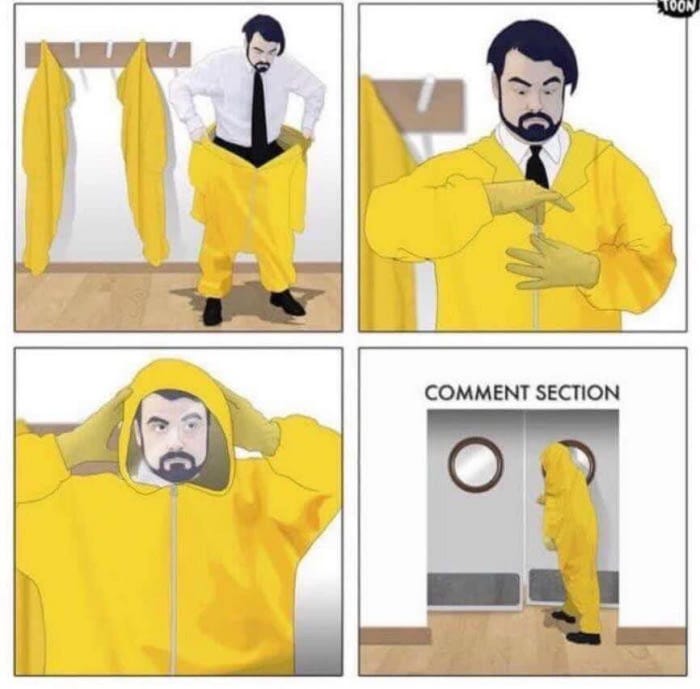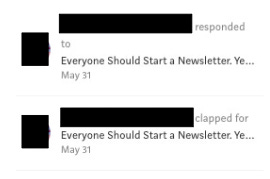Is the Fear of Criticism Holding You Back From Writing More?
Tactical advice on handling an inescapable reality of publishing content
📣 Announcements
I’m offering a 10% commission (up to $1000) if you refer someone who needs a Chat-GPT app built to All-In Consulting.
Have them mention your name, and I’ll reach out when the deal closes.Just a heads up - The domain for this newsletter will change from michaellin.substack.com to michaellinwrites.com starting next week.
A few months ago I gave a talk about writing on Medium. It was for my friend Greg Lim and his online community of writers interested in self-publishing books on Amazon.
Initially, I thought this would be a straightforward lecture. So I prepared a few slides with tactical advice on writing like how I outline, take notes, and structure articles.
But during the talk one audience member asked me a question about “How I deal with the fear of criticism of my writing.”
That question turned into a 20-minute discussion on mental roadblocks that stop writers from publishing more.
This question has stuck with me ever since as I realized two things from that lecture:
Most people want to write more
But they don’t - not for lack of talent, but for fear of criticism.
It’s a topic that I’m familiar with. I was plagued with this exact fear before publishing my first article. In fact, I was so wracked with this fear, thinking “who am I to even talk about this,” that it took me 6 weeks to finish that piece.
Greg suggested I write an article about this topic. So today, I wanted to share what I told the audience about how to handle this fear that might be stopping you from publishing more.
It’s Not Easy To Get Comments
First off, many new writers don’t realize that getting any response on your writing, both positive or negative, is difficult. Most of the time, writing feels like shouting into a void.
Reader interaction with your writing is like a funnel. Out of everyone who reads it, a fraction will finish reading the article, a fraction will “like” it, a smaller fraction of that will “comment,” and an even smaller fraction of that will “reshare” it.
In fact, if you look at my Medium articles, I’ve published 31 articles to date, and only 6 of them have gotten more than 5 comments on them. So 81% of my articles barely get any comments at all, and this is with 15.6k followers.
Generally I find the comment to view ratio to be about 0.1%. Which means in order to get a single comment, you would need to rack up at least 1,000 views on an article. This isn’t that easy to do when you’re starting off and have a small audience.
In fact, many of my articles on Medium don’t even reach 1k views - most of my views are actually from this newsletter, which is why I prioritize sharing this newsletter over growing on Medium.

The reality is that most topics that people tell me they want to write about are not that provocative to warrant much, if any, negative criticism. Some people tell me they want to write podcasts or book summaries - it’s hard to imagine anyone criticizing that.
I’ve also heard other writers tell me they want to write more about their travel stories, life stories, hobbies, work, and interests. These topics are also fairly uncontroversial.
So starting off, write like no one is even reading because the chances of getting negative criticism is objectively low.
Focus on the People Who Will Benefit From Your Writing
Second, I compare writing to being a chef. Even if you’re the best chef in the world, someone isn’t going to like your food.
Similarly even if you were the best writer in the world, there will still be people who won’t like your writing. So instead of focusing on the critics, it’s better to focus on your future fans - the people who will love your writing and the people you want to help.
In fact, if you think about some of your favorite songs or books, you’re bound to find negative reviews even though you loved it.
If those creators worried about the critics all day, then you would’ve been denied something you really enjoyed. How sad would that be?
And if you worry about your critics, you could deny your biggest fans content that could’ve really made a difference in their lives.
Sometimes, I get messages from people months or even a year after reading something I wrote. This tells me that 1) even if you’re not getting responses, you could still be leaving an impact on people and 2) the impact you have on the people who do like your writing could be so great that it’s worth pushing through the criticism to reach them.
Most critics leave “fly-by” comments. They post criticism, and you will never hear from them again as they move on with their day. Your future fans though will stick with you for a long time.
That said, I understand that criticism can be tough to handle. Here are a few tactics I use to better manage criticism.
You Don’t Have to Read Every Comment
First off, I’ve noticed that certain platforms tend to be more positive, and certain ones tend to be more negative. Particularly platforms where people can remain anonymous tend to be more toxic, like Reddit or Blind, so I don’t prioritize posting on those platforms.
Whereas some communities I’ve noticed are far more positive. For example for engineers, I’ve noticed HashNode comments tend to be really positive, so I prioritize posting there.
Also on Medium for example, I usually only read comments if it’s followed by a clap or a follow because then I know that comment will be positive.
If it’s a lone comment without a clap or follow, I generally won’t read it as those tend to be negative.
Asking for Feedback
Another tactic that has helped with reducing the amount of criticism I get is by asking for feedback before publishing any article I write. I usually do this with my writing coach and I will ask them to give me feedback like:
How did you feel after reading this article? (if it’s not a positive feeling, I’ll work with them to fix the tone)
Is there anything I said that could get me canceled or rub people the wrong way? (this will tell me what parts to tone down or reword)
Another exercise I do regarding feedback is I imagine the different audiences that could read it and how each group might respond differently to it. For example, when I wrote this article about my experience going to Summit Series, I asked my writing coach:
“If you were the founder of Summit, how would you feel reading this?”
“If you were a participant of Summit, how would you feel reading this?”
“If you didn’t go to Summit, what are your impressions of the event after reading this?”
That way I make sure I don’t unintentionally offend any particular one group.
I recommend you do the same and take stock of how different audiences might react to your content as well. For example, let’s say you wanted to write an article giving career advice for engineers on promotions, like in the image below.
As a quiz, what are the different audiences you want to consider who could read this article?
Scroll past the image to see the answer:
In this case, I would consider how:
a manager
an individual contributing engineer
and how someone working in a non-technical role
might feel about the article. And if the article has something an individual contributing engineer might like, but which a manager might disagree with, I would see how I can reword those opinions so as to not rub a manager the wrong way.
Lastly, it’s important to also consider who you ask for feedback. For example, if I write an article about engineering, and I’m concerned about technical correctness, then I’ll ask another engineer to review the article before publishing.
If you’re publishing an article about health and science, it could be worth asking a friend of yours in healthcare to review it.
But either way, I highly recommend asking for some feedback before publishing. Although some criticism is unavoidable, feedback can help catch 90%+ of the easy-to-fix issues that will make your publishing journey much more enjoyable.
And if you need help, feel free to send any drafts my way - I’m happy to take a quick look at it and give some feedback!
Conclusion
I want to conclude with a final quote from Teddy Roosevelt on his opinion of critics:
“It is not the critic who counts, nor the man who points out how the strong man stumbles, or where the doer of deeds could have done them better.
The credit belongs to the man whose face is marred by dust and sweat and blood, who strives valiantly, who errs, who comes short again and again, because there is no effort without error and shortcoming…
At worst, if they fail, they fail while daring greatly, so that their place shall never be with those cold and timid souls who neither know victory nor defeat.”
As a fellow writer in the arena, go forth and speak your truth. You’re not doing the world any favors by being small and shrinking from the critics.
If you have something important to say, it’s your duty to go out and spread your message.
I’m rooting for you!
Whenever you're ready, there are 2 ways I can help you:
“Beginner’s Guide to Medium in 60 minutes” - where I break down my entire writing process and show you how to grow your Medium following.
“How to Be an Engineer Influencer” - where I teach W-2 employees how to diversify their income streams by building an audience on social media.
Connect with me on social media here.







Loved the “Man in the Arena” reference from Teddy Roosevelt.
Great article Michael and hope it inspires others to write!
Thanks for the article Michael, great read!
> I usually do this with my writing coach and I will ask them to give me feedback
That's interesting, where did you find a writing coach?